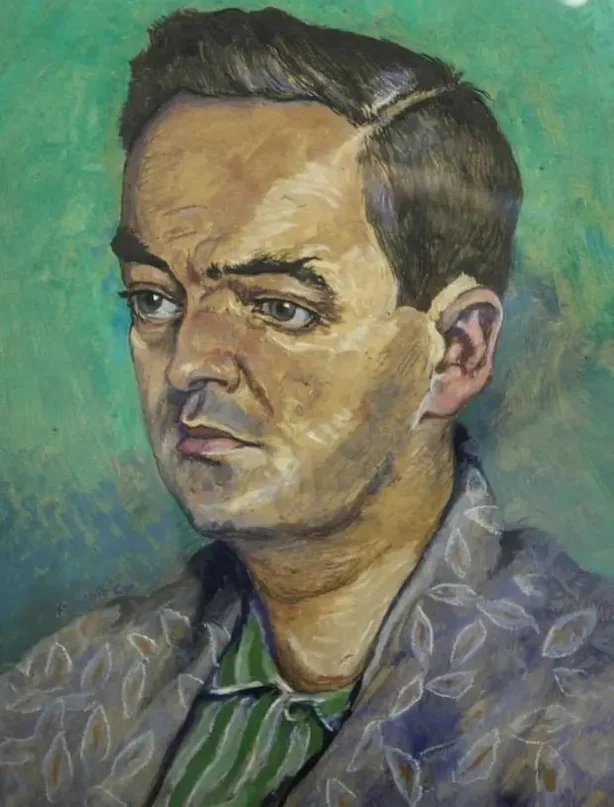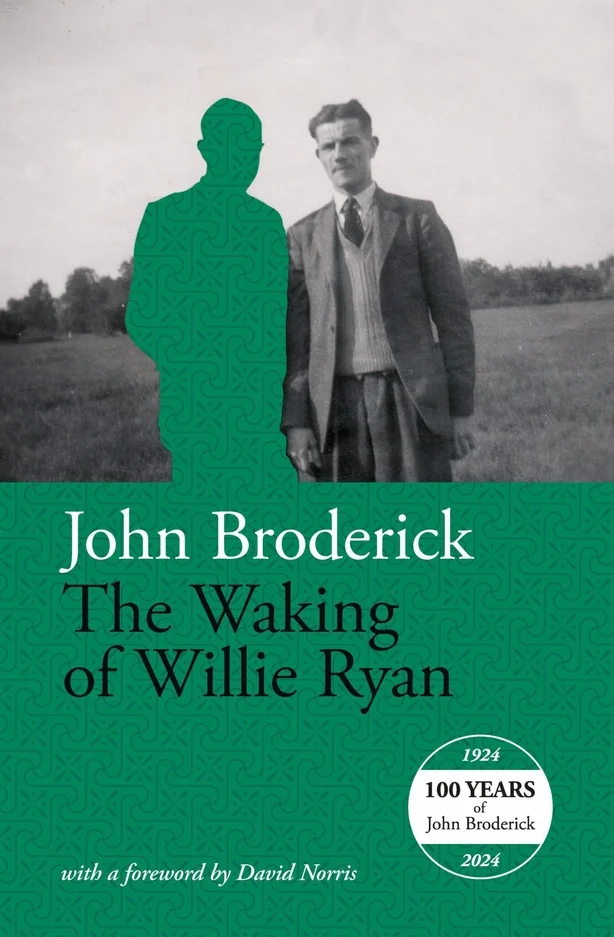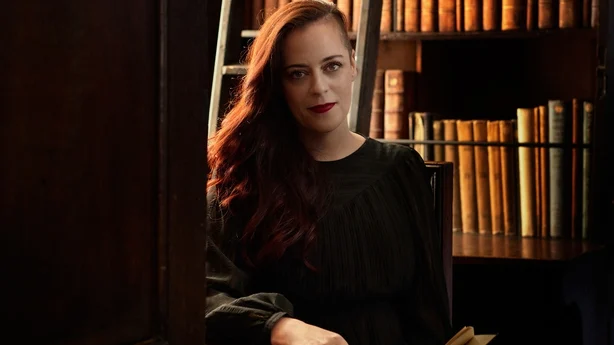On Tuesday the 30th of July, the Arts Council in partnership with Westmeath County Council will pay tribute to Athlone native, writer, literary critic and patron of the arts, John Broderick with a celebration on what would have been his 100th birthday.
The event will see the re-publishing of Broderick's seminal book The Waking of Willie Ryan by Lilliput Press, in print and for the first time as an audio book (read by actor Naoise Dunbar), plus the announcement of the 2024 John Broderick Writer In Residence award; following his death, the author bequeathed his estate to the Arts Council for "the benefit and advancement of the Arts in Athlone" - this endowment has since established the writer's residency in his name.
A previous recipient, author and poet Annemarie Ní Churreáin, has composed a piece to mark the occasion - read below.
John Broderick was a writer of prickly truths. The Waking of Willie Ryan, first published in 1965 (republished by The Lilliput Press in 2004 and 2024), is among his finest stories. Willie, a gay man who has escaped the asylum after 25 years, is coming home to die 'in the middle of the great central plain of Ireland' and in the presence of the people who were responsible for his incarceration.
It’s a confronting portrait of religion, family dynamics and desire. When a white hen strays out across the opening lines, narrowly missing a car, an Ireland that exists somewhere on the outer edges of living memory swerves back into focus. Willie, now a snow-haired man, stands on the cusp of his homecoming, in pitiable wonder, clasping a single leaf between his palms.
Sex, power and the closeted lives of ordinary people are Broderick’s touchtone themes. His worlds, often pocked by jealousy and betrayals, reveal the toxicities of a deeply troubled society. Broderick’s circling of desire, particularly homosexual desire, offers an unflinching critique of lives and relationships mired in the hypocrisies of the Catholic Church. Unsurprisingly, Broderick’s contentious plots earned him a reputation as—and I quote here David Norris—"an awkward customer of 1950s literary Ireland". It’s a delightful profile, given Broderick’s beginnings as the only child of the proprietors of Broderick’s Bakery in Athlone. It stirs the question of what the young Broderick observed as he lingered at the customer counter? What did he learn there about interactions, transactions and what people will do to get what they want?
Sex, power and the closeted lives of ordinary people are Broderick's touchtone themes.
Willie is coming home to die but Willie’s brother and sister-in-law, well-to-do parishioners, are reluctant to welcome the elderly man back into the family fold. To do so, would be to stir up the ghosts of shame, secrecy and guilt. "The mental asylums are Ireland’s awkward institutions" writes Brendan Kelly, Professor of Psychiatry, reminding us that unlike mother and baby homes, or industrial schools, the asylums did not fall under the control of religious orders; they were often State-run and locally funded. Willie’s story spotlights the asylums, originally built to treat mentally ill people, as places used by families to offload non-conforming or ‘problematic’ relatives. In the absence of records to understand the full degree to which queer people in Ireland were impacted by such cruelty, The Waking of Willie Ryan functions as an alternative record. It holds a space for untold histories.

(Pic: Westmeath County Council Arts Office)
"Every family has its crosses," says Mrs O’Neill but Willie is not actually mentally ill. Willie is merely aged and frail as a leaf beneath the burden of trauma. It is Chris, Willie’s nephew, who eventually takes him in. It is Chris who washes his uncle’s feet in an act of almost unbearable, biblical tenderness. Willie’s homecoming is both of its time and, sadly, almost two decades ahead. In 1982 the first AIDS case was diagnosed in Ireland and so began the tragic homecomings of a generation of gay men who were forced back into their boyhood bedrooms, to die in the same family homes from which they had once fled. Willie and his co-characters embody the pulsing culture of stigma and anxiety that clouds queer experience, and the stilled body, the body at ease, is a rare thing in a Broderick story. The characters’ dialogue, seldom unaccompanied by some incidental action, captures bodies living in nervous and restless realities. When Willie confronts Fr. Mannix, the Catholic priest who helped his family incarcerate him, an ominous deal is struck. To die at home, Willie must first redeem himself by agreeing to receive Holy Communion at a special Mass in Chris’s home. Painfully, Willie can only be accepted back through this public, collective spectacle. As an agreement that seeks to purify and rehabilitate the homosexual man, this spectacle carries with it the scent of today’s so-called "reparative" or "conversion" therapy.
"It’s horrible to think of anybody dying without making their peace with the Church," Chris ponders the weight of sin. Broderick himself was an enthusiastic subscriber of the Catholic Church, though the mixed-up morality around sexuality vexed him. Still, religiosity, religious ritual and religious symbolism is stitched carefully into the lining of his characters, wounding and embellishing their lives. In fact The Waking of Willie Ryan unfolds over fourteen chapters, with subtle nods throughout to the imagery of the fourteen Stations of the Cross. Willie eventually gains the upper hand in his epistemological battle with Fr Mannix when he admits that he has received Holy Communion without first making Confession, purposefully committing an act of sacrilege. It’s a sour victory, further soured for the reader by Willie’s use of the word ‘vice’ to describe homosexual sex. Speaking to the priest about Roger [Willie’s former lover], Willie says "…I never wanted it, not with him anyway. It was he – how would you put it? – seduced me. Yes, that’s how you’d put it. I hated it; but I did it because I loved him."

"We [novelists] are sometime accused of turning up stones for the sensational purpose of revealing the maggots underneath" writes Broderick in an essay, signalling the only sensible view that it is not the job of the novelist to behave. Similarly, it is not the job of fiction to be "right" or "good". The Waking of Willie Ryan was carved out of a phobic era when queer love was, often, the source of ridicule, disgust or fear. It is not shocking that some of the literature arising out of this climate and atmosphere is, at times, discomforting, contradictory and stuffed with conundrums. Broderick’s writing invites complex questions, and a challenging dimension of his fiction includes his depictions of the lives of women. Actually, it has been argued that the majority of Broderick’s women are, in essence, men. Like men, Broderick’s women pursue sex in bodies that thrive magically outside repercussion. Perhaps this magical thinking could be excused as simple naivety if it were not for a curious tic more akin to wilful misunderstanding— and maybe even jealousy—that raised its head publicly and most famously in his scathing reviews of his brilliant peer, novelist Edna O’Brien.

Who is Willie Ryan in the flow of Irish queer history? And what would Broderick make of Ireland in 2024? The Waking of Willie Ryan was published in 1965 and promptly banned. It was the same year that Roger Casement’s body was returned to Ireland. Casement, an executed 1916 rebel, is the alleged author of the ‘Black Diaries’ that continue to hold him at the centre of a long-standing controversy over his sexuality. In his graveside speech at Glasnevin Cemetery, Éamon de Valera declared "we claim him and we are glad to have him back among us". In 1974 the first Dublin Pride march, comprising 10 people, departed from the Department of Justice on Dublin’s Stephen’s Green to the British Embassy on Merrion Road, to protest archaic Victorian legislation criminalising intimacy between men in Ireland. An erosion of the silence and invisibility around queer lives gradually ensued. In 1993 the long legal battle, taken by David Norris to the European Court of Human Rights, resulted in the decriminalisation of sexual activity between men. Additional legislative jigsaw pieces dropped into place and, finally, in May 2015 the Republic of Ireland become the first country in the world to legalise same sex marriage as mandated by the results of a referendum.
"Gone, gone," laments Willie's tearful brother. "When all is said and done he didn’t get much out of this life. Not even a wake". Broderick’s body of work predates many of the waves of social change in Ireland that have led to equality for queer people. It also predates most of what we know today about clerical abuse, the mistreatment of women and children, and institutional scandals. The Waking of Willie Ryan is forged out of the heart of the country; out of Broderick’s feeling for Athlone - a heartland town named for Luain who is said to have guided people across treacherous waters before the first bridges were built. Flowering among the cacophony of queer literary voices in Broderick’s wake are voices like those of Colm Tóibín, Emma Donoghue and John Boyne. Paul McVeigh’s Queer Love: An Anthology of Irish Fiction (Munster Literature Centre, 2021) demonstrates the breadth of that cacophony. In that same year Paul Maddern’s Queering the Green: Post-2000 Queer Irish Poetry (Lifeboat Press) was published. Strictly speaking, Athlone is not the exact geographical centre of Ireland but it’s close by the ancient ceremonial site widely considered to be the country’s symbolic centre and the burial ground of the Goddess Ériu. In more ways than one, Broderick—the self-styled laureate of the midlands— was at the centre of Irish imagination, though he referred to himself simply as "a provincial". "The writer is the last free man" he mused "for he is essentially a private person, and no one ever knows what he is going to say next.
The event celebrating 100 years of John Broderick is at the Luan Gallery, Athlone Town on Tuesday the 30th of July, 2024 - the event is free of charge, and all are welcome - reserve your ticket here.
The Waking Of Willie Ryan and other titles by John Broderick are published by The Lilliput Press.
Disclaimer: The copyright of this article belongs to the original author. Reposting this article is solely for the purpose of information dissemination and does not constitute any investment advice. If there is any infringement, please contact us immediately. We will make corrections or deletions as necessary. Thank you.






